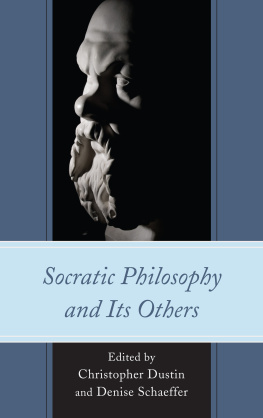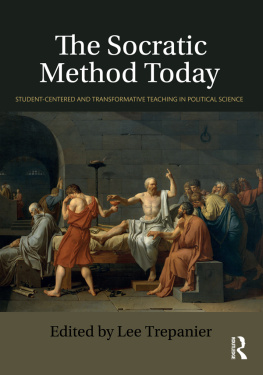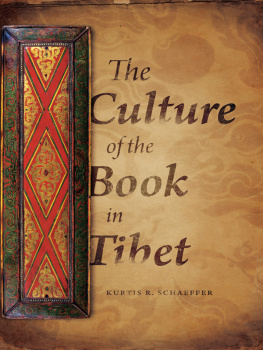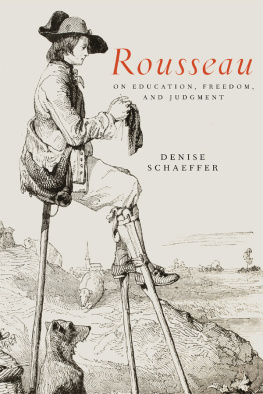Schaeffer Denise - Socratic Philosophy and Its Others
Here you can read online Schaeffer Denise - Socratic Philosophy and Its Others full text of the book (entire story) in english for free. Download pdf and epub, get meaning, cover and reviews about this ebook. City: Lanham;MD, year: 2015;2012, publisher: Lexington Books, genre: Science. Description of the work, (preface) as well as reviews are available. Best literature library LitArk.com created for fans of good reading and offers a wide selection of genres:
Romance novel
Science fiction
Adventure
Detective
Science
History
Home and family
Prose
Art
Politics
Computer
Non-fiction
Religion
Business
Children
Humor
Choose a favorite category and find really read worthwhile books. Enjoy immersion in the world of imagination, feel the emotions of the characters or learn something new for yourself, make an fascinating discovery.
- Book:Socratic Philosophy and Its Others
- Author:
- Publisher:Lexington Books
- Genre:
- Year:2015;2012
- City:Lanham;MD
- Rating:5 / 5
- Favourites:Add to favourites
- Your mark:
- 100
- 1
- 2
- 3
- 4
- 5
Socratic Philosophy and Its Others: summary, description and annotation
We offer to read an annotation, description, summary or preface (depends on what the author of the book "Socratic Philosophy and Its Others" wrote himself). If you haven't found the necessary information about the book — write in the comments, we will try to find it.
Socratic Philosophy and Its Others — read online for free the complete book (whole text) full work
Below is the text of the book, divided by pages. System saving the place of the last page read, allows you to conveniently read the book "Socratic Philosophy and Its Others" online for free, without having to search again every time where you left off. Put a bookmark, and you can go to the page where you finished reading at any time.
Font size:
Interval:
Bookmark:
Socratic Philosophy and Its Others
Socratic Philosophy and Its Others
Edited by Christopher Dustin and
Denise Schaeffer
LEXINGTON BOOKS
Lanham Boulder New York Toronto Plymouth, UK
Published by Lexington Books
A wholly owned subsidiary of The Rowman & Littlefield Publishing Group, Inc.
4501 Forbes Boulevard, Suite 200, Lanham, Maryland 20706
www.rowman.com
10 Thornbury Road, Plymouth PL6 7PP, United Kingdom
Copyright 2013 by Lexington Books
All rights reserved. No part of this book may be reproduced in any form or by any electronic or mechanical means, including information storage and retrieval systems, without written permission from the publisher, except by a reviewer who may quote passages in a review.
British Library Cataloguing in Publication Information Available
Library of Congress Cataloging-in-Publication Data
Socratic philosophy and its others / Edited by Christopher Dustin and Denise Schaeffer.
pages cm.
1. Socrates. 2. Plato. 3. Philosophy, Ancient. I. Dustin, Christopher A. II. Schaeffer, Denise, 1968
B317.S6435 2013
183'.2dc23
2013009863
ISBN 978-0-7391-8140-9 (cloth : alk. paper)
ISBN 978-1-4985-2760-6 (pbk. : alk. paper)
ISBN 978-0-7391-8141-6 (ebook)
TM The paper used in this publication meets the minimum requirements of American National Standard for Information Sciences Permanence of Paper for Printed Library Materials, ANSI/NISO Z39.48-1992.
Printed in the United States of America
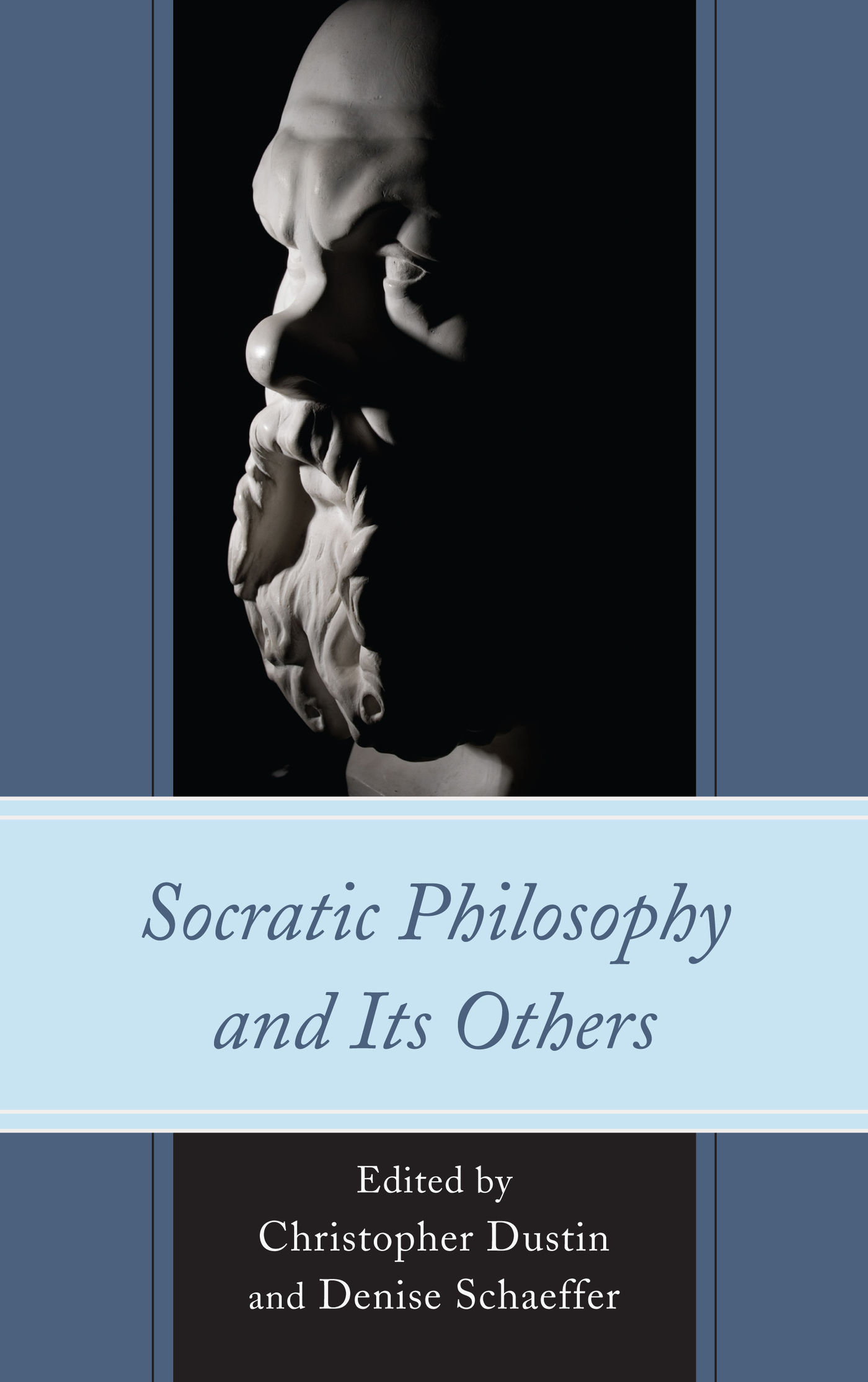
The editors are grateful for permission to reprint the following essays: Catherine Zuckerts Why Socrates and Thrasymachus Become Friends originally appeared in Philosophy and Rhetoric vol. 43, no. 2 (2010). An expanded version of Mary B. Nichols and Denise Schaeffers Philosophy and Sophistry in Platos Euthydemus was published in Plato: Euthydemus, trans. Gregory McBrayer and Mary P. Nichols (Focus Publishing, 2011). Jacob Howlands essay on the Apology is reprinted from The Review of Politics, vol. 70 (2008). Michael Daviss Philosophy in the Perfect Tense: On Platos Lovers appeared in the Graduate Faculty Philosophy Journal, vol. 10, no. 2 (1985). The editors also wish to thank the College of the Holy Cross for fellowship support toward the completion of this volume.
Christopher Dustin and Denise Schaeffer
Strange Fellows
The goal of this collection is to explore the profound entanglement of Socratic philosophizing with some of its generally conceived opposites or othersmost obviously, the figure of the sophist, but also the tragic hero, the tyrant, the rhetorician, and the lover of sights and sounds. Addressing a wide range of Platos dialogues, the authors of these essays suggest that the harder one tries to disentangle Socrates activity from that of his apparent opposites, the more entangled they become. Yet, only by taking seriously this entanglement, and exploring it fully, does the distinctive character of Socratic philosophy emerge.
Scholars often frame the question of philosophy and its others in terms of how Plato might have sought either to shield philosophy from its challengers, or conversely to shield the political sphere from the effects of philosophic skepticism. This collection is distinguished by its willingness to take seriously the potentially troubling implications of philosophical activity itself, turning philosophys skeptical gaze upon its own foundations. The challenge is internalized, and thus intensified: How might philosophy properly defend itself against a problem that arises from within it? Ultimately, these essays help us to see how this question is inseparable from an understanding of Platos art of writingitself an object of suspicion, from a Socratic point of view. As a whole, the collection sheds new light on the importance of the artful ways in which Plato not only represents philosophy in relation to what it is not, but also makes it strange to itself. The collection treats Platonic dialogues that are more familiar (Republic, Phaedrus, Sophist, Apology, Gorgias) together with works that are less well known (Lovers, Theages, Greater Hippias, Lesser Hippias, Euthydemus, Charmides). In this way, too, it strives to make the familiar revealingly strange, while the less familiar becomes, perhaps, less strange.
In the opening essay, Catherine Zuckert explores the unlikely friendship that Socrates acknowledges between himself and his most hostile opponent in the Republic. Thrasymachus is one of two outstanding rhetoricians against whom Socrates is matched in Platos dialogues, the other being Gorgias in the dialogue that bears his name. In Zuckerts view, Socrates engagement with Thrasymachus sets up a revealing contrast with the Gorgias, where we never see Socrates making friends with his enemy. While both dialogues stage a confrontation and highlight the opposition between Socratic reasoning and rhetorical persuasion, Zuckert sees an important difference in the way the relationship between the philosopher and the rhetorician is modeled by each. What is implicit in Socrates otherwise cordial encounter with Gorgias is made explicit by his increasingly antagonistic exchanges with Polus and Callicles. Gorgias is led by his sense of shame to cede the argument just as the fundamental issueof the relation between rhetoric and justicecomes to the fore. The arguments with Polus and Callicles expose the rhetorical art as but a means to, or a disguised form of, tyranny. Although many of Callicles claims about rhetoric, justice, and power seem to anticipate those of Thrasymachus, Zuckert argues that they are not as close as they appear. Looking beyond the superficial likeness of their arguments, Zuckert goes on to identify an important difference in Thrasymachus soul, which turns out to be the hidden ground of his friendship with Socrates. Despite Thrasymachus own defensiveness in the face of the philosophers attacks, there is something between them: a shared belief that the decisive question is what is truly good. If Socrates sees his victory over Thrasymachus as a failure, just as his defeat of Callicles proved to be, it is for a different reason. Thrasymachus is unpersuaded because he has yet to see the significance of this fundamental agreement between Socrates and himself. If Socrates declaration that he and Thrasymachus have become friends (498d) suggests a more intimate relationship between philosophy and rhetoric, Zuckert contends, it is not because rhetorical persuasion may be useful or necessary if philosophers are to gain the power of rule. It points to something intrinsic to the character of both.
The second essay, coauthored by Michael Davis and Gwenda-lin Kaur Grewal, approaches Socratic reasoning through an exploration of the distinctive character of Socratic piety, focusing in particular on Socrates daimonion and its significance for understanding his philosophic activity. Generally, Socrates daimonion functions in a negative way, warning Socrates off certain behavior, but in the Theages it has the additional function of telling him what others should not do. The Theages is thus peculiar, for in it Socrates becomes something of an oracle. The Theages contains the most extensive treatment of Socrates daimonion in Plato. It comes in at the end of the dialogue to explain why Socrates accepts some as students and rejects others. The underlying theme of the
Next pageFont size:
Interval:
Bookmark:
Similar books «Socratic Philosophy and Its Others»
Look at similar books to Socratic Philosophy and Its Others. We have selected literature similar in name and meaning in the hope of providing readers with more options to find new, interesting, not yet read works.
Discussion, reviews of the book Socratic Philosophy and Its Others and just readers' own opinions. Leave your comments, write what you think about the work, its meaning or the main characters. Specify what exactly you liked and what you didn't like, and why you think so.

